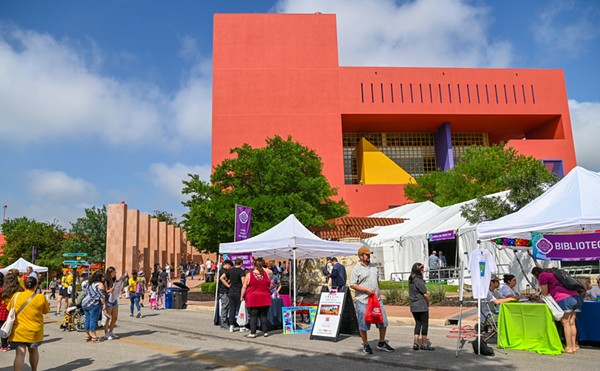When Rosemary Catacalos left the prestigious Poetry Center in San Francisco to take over the directorship of Gemini Ink in 2003, the small writer’s center was on the verge of financial failure. To Catacalos, a San Antonio native returning home after 16 years in the Bay Area, the shortcomings were broader in scope. “This town is 25 percent functionally illiterate in English. They need English to make a living,” she said at an interview last week. “We don’t have the luxury of being just a writer’s center. We have only the absolute moral mandate to serve people who need to have English language skills to survive.”
Gemini Ink continues to offer workshops for developing writers at the university level, and holds free public readings by internationally acclaimed writers. They partner with many nonprofits, such as SAY Sí, Southwest School of Art, Artpace, and the San Antonio Museum of Art.
But South Texas’ only nonprofit dedicated exclusively to literature is also madly activist. Their Writers in Communities program (WIC) goes into public schools as might be expected, and into community settings bearing extreme difficulties, too — places like juvenile detention centers, teen pregnancy centers, and homeless shelters.
Being a professional makes an impact on young writers. Catacalos describes the setup this way: “If I would bring my book and read, they would go, ‘Miss, miss! That’s your book?’ Yes, this is my book, and you can make a book, too. And not only that, but when you finish writing this thing, we’re going to put you in a book. And you will have to read it. And you will come and read to your family, and to your friends, and everyone will see you read it. And they go, ‘Miss, miss! I’m going to read?’ It means the world to them.”
For a city like San Antonio, bilingual education is all the more important for the simple reason it facilitates learning English.
“When you come to this country as a Spanish speaker you make a literal, word for word, translation of what you think must be said,” Catacalos said. “For instance, ‘Yo tengo un caro azul’ becomes ‘I have a car blue.’”
If the child’s teacher is bilingual, and understands the mangled syntax, learning English becomes all the easier.
“If not,” Catacalos said, “the child fails immediately. When the child fails immediately, the child says, ‘I’m no good. I can’t do this.’ When the child says ‘I can’t do this,’ then the child says, ‘I’m not going to do language anymore.’ When the child says, ‘I’m not going to do language anymore,’ the child says, ‘I don’t have story anymore.’ When the child doesn’t have story anymore, the child ceases to exist.”
As Catacalos puts it, “Whether they become writers or not is totally beside the by. In fact, we are just wanting to make people think about the thing. You know, writing is thinking.”
And while new budget cuts will increase the challenges, Catacalos believes in a deeper power living in San Antonio.
“Somehow a consciousness permeates this city with story. We are a story center. We are in some ways almost magical that way.”

















